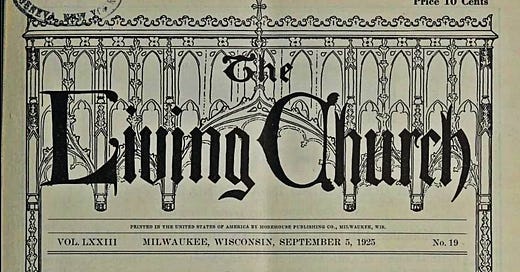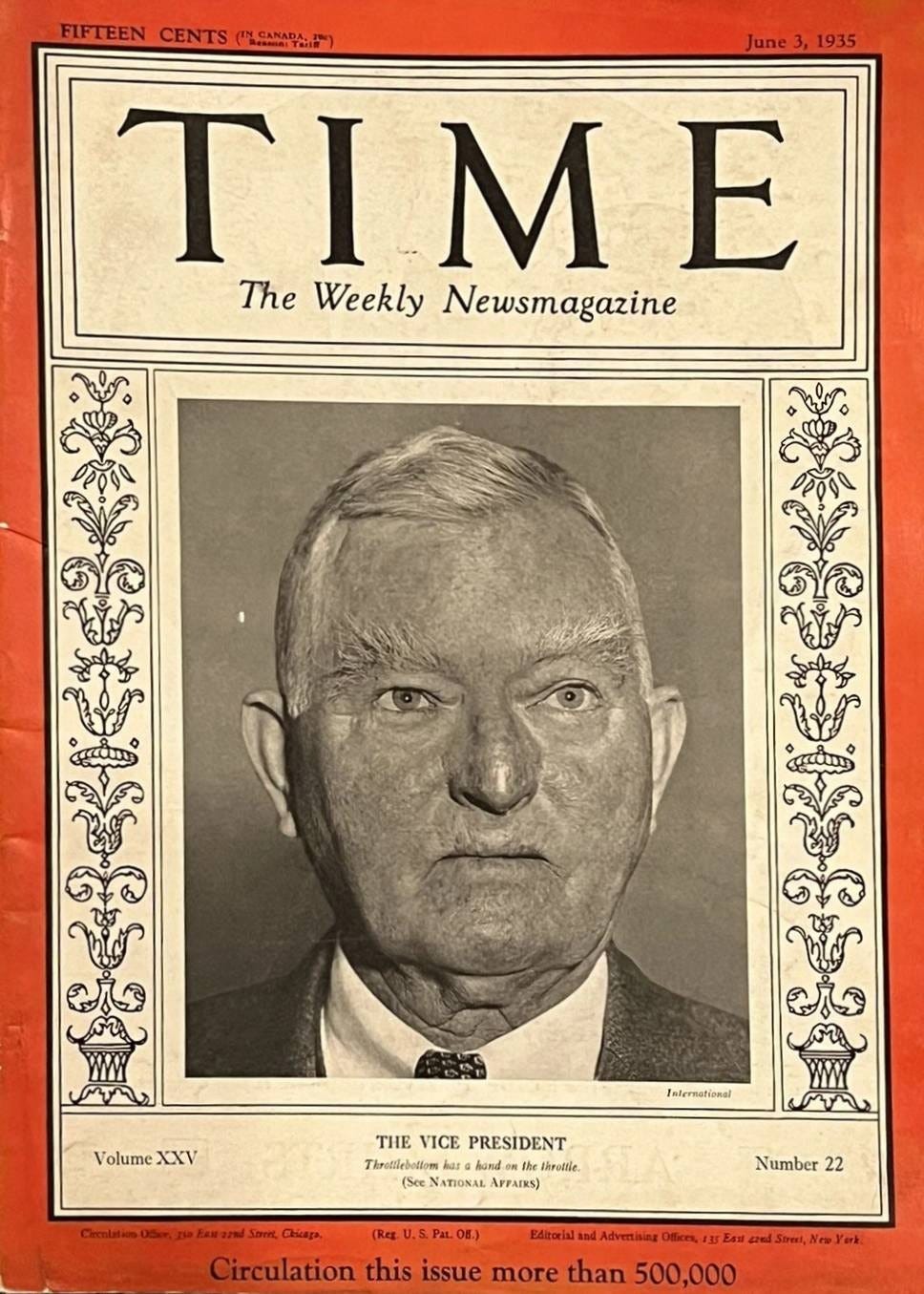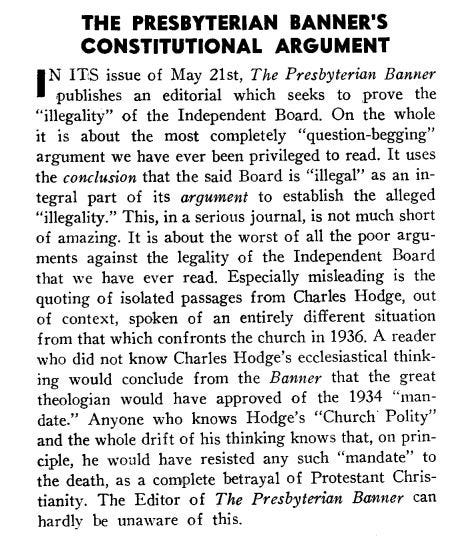By Brad Isbell
As early as 1925, Machenism was a codeword for BIG FAT CHURCH MEANIE-PANTS EXTRORDINAIRE…only two years after Christianity and Liberalism was published. It would seem that purveyors of clear and punchy polemic have never gone unpunished in the parlors of the pious. A review (of someone else’s book) in the old Anglo-Catholic magazine, The Living Church, is the first place we find this eponymous petard directed at our favorite presbyterian:
As a study of Modernism more sane in spirit and catholic in charity one may cite Dr. Hall’s Christianity and Modernism. Both show the tremendous advantage of defending a faith which has back of it the witness of Christian experience and the wholeness of Catholic truth, rather than the support of man-made theories. Controversies which began by being doctrinal have too often degenerated into the bitterness of personal antagonisms. Compare Dr. Machen’s spirit—that of the controversial advocate—with Dr. Hall’s method—that of the Christian apologist—and the difference is manifest. Even Dr. Fosdick, who began as a constructive teacher, has sometimes been pushed by controversy into an attitude of destructive antagonism. The present volume does not indulge in personalities, but its argument is of the rigidly mechanical type that verges upon “Machenism,” and is but a step short of individual attack.
Breaking news—Machen was a controversial controverter of ecclesial controversies. The big question is not why Machen trampled a few toes, but why there weren’t more pastors hopping around on one foot, wincing in pain and stifling bad words. Of what was Machen a “controversial advocate? Well, it was for the historic Christian faith, the Bible, and supernatural religion. And poor Fosdick! To hear this reviewer tell it, Machen “pushed” the dear man into controversy! The humanity! Rigid, mechanical Machen could have been worse, it seems, but he was still pretty dang hurty.
Ten years later, TIME magazine—evidently no friend of conservative Christianity—also delighted in the drubbing that “fundamentalists,” of whom Machen was supposedly chief, took at the PCUSA’s 1935 General Assembly (its 147th) in lovely Cincinnati. And the breezy magazine correspondent quoted the haters who huffed about “Machenism!”1
“Machen & Machine”—that was the actual headline in TIME’s religion section on June 3, 1935. The piece began with a shot at Fundamentalists based on the overheard sniping of reporters, and as someone who used to be a “newshawk,”2 this account has the deafening ring of truth about it:
“Several of them,” said newshawks to one another, “are broke. They would like nothing better than a chance to bring a libel suit against someone.”
The reporters were talking about Fundamentalists—chief subject of conversation in Cincinnati last week as 1,000 commissioners (ministers and elders) gathered for the 147th General Assembly of the Presbyterian Church in the U.S.A. But beyond stressing the obvious point that it would not do to call a Fundamentalist a scoundrel, such libel talk only exaggerated the simple fact that the “Bible-believing” minority of the Presbyterian Church was restless, irritable, unhappy. Well it might be, for it knew that the 147th General Assembly was ready to belabor it and vote it down at every turn.
It certainly would not do for supposedly objective reporters (rather than columnists) to write that Fundamentalists (OK, we’ll give in and use the word without scare quotes) were scoundrels, but it must be said that the derisive reporters did seem to understand many of the issues. It was noted that the Fundamentalists were leaderless, Machen—”tried, convicted and suspended for disturbing the peace within his church”3—not being a commissioner:
But he was in Cincinnati, leading the fight from the sidelines4 and in the newspapers with all the zeal of a man who has given his name to a movement. (“The issue,” said onetime Moderator John McDowell, “is Presbyterianism v. Machenism.”) Plump-faced, scholarly Dr. Machen last week saw Machenism trounced…
The reporter described the unseating of three “Machenite” commissioners, “ all members of the rebel Independent Board for Presbyterian Foreign Missions,” and quoted the response of conservative leader and Machen ally, H. McAllister Griffiths: “The machine may find out that its high-handed tactics have at last awakened the Church to Modernist tyranny.” What the “Machinists” found out, we gather, is that top-down tyranny worked for the mammoth mainline church for decades…until it didn’t.
Though Fundamentalists repeatedly talk of a Presbyterian “machine,” few speak up in meeting to give it a name and address. Last month the Presbyterian Banner,5 anti-Fundamentalist weekly, made bold to list some able machine men: Dr. Covert, Dr. McDowell, Stated Clerk Lewis Seymour Mudge, Dr. Robert Elliott Speer, Dr. Charles Rosenbury Erdman, President Joseph Ross Stevenson of Princeton Theological Seminary, Dr. Hugh Thomson Kerr, Dr. Mark Allison Matthews6—onetime Moderators all.
This is a fascinating list, not of liberals, but of moderates and evangelicals—churchmen in the “company man” sense. Their priority was peace, unity, and growth, and doctrine (and “doctrinalists”) be damned. Every denomination has them. And they were Machen’s undoing. The reporter clearly suggested that fear of “the machine” was a conspiracy theory:
If these Presbyterians represent a machine, it is because they stick together,7 see to it that Assemblies run smoothly, unite in a conservative distaste for extreme Fundamentalism. Last week when the Cincinnati Assembly quickly and without acrimony elected a new Moderator, only the Machenites seemed to attribute it to the sinister activities of a machine.
“Lack of acrimony” was more desirable than strict doctrinal fidelity. Things never change; there is nothing new under the presbyterian sun. And while the cogs of the presbyterian judiciary turn slowly, they are hard to stop: “…the commissioners decisively voted down a proposal to halt various disciplinary measures started against members of Dr. Machen’s Independent Board.”
Machen had not given up in 1935, though the legibility of the writing on the wall was slowly improving.
But, taking a good long view, Dr Machen announced he would be able to appeal his cause to the 1936 General Assembly. The defeat he expects, he said, will probably lead to a schism in the Church. “I hope so,” declared militant Dr. Machen. “I want to see the Church purged of unbelief. I want the elimination of those untrue to the constitution. They are in control of the Church at present.”
Machen was the squeakiest of wheels, but he was right.
This article’s subtitle rather obviously refers to John Frame’s “Machen’s Warrior Children.”
I don’t think I ever had one of my photographs appear in TIME, but I know that I had at least one in their rival, Newsweek.
Two months before TIME had reported, “In Trenton, N. J. last week a Presbyterian judicial commission of six unanimously found Rev. Dr. J. Gresham Machen, fiery Fundamentalist, guilty on six counts of having defied the authority of his Church by belonging to the Independent Board for Presbyterian Foreign Missions. The commission sentenced this “divisive doctor” to suspension from the ministry.”
Imagine what Machen could have done with text messaging!
The Banner did indeed come to oppose Machen, as a snippet from The Presbyterian Guardian proved a year later in 1936:
Matthews, the progressive fundamentalist, is an amazing figure. We’ll be writing more about him. You can hear a reference to him on the recent, Machen-related Reformed Forum podcast.
See also our friend Ryan Biese on“Presbycrats,” somewhat related to “machine men.”






